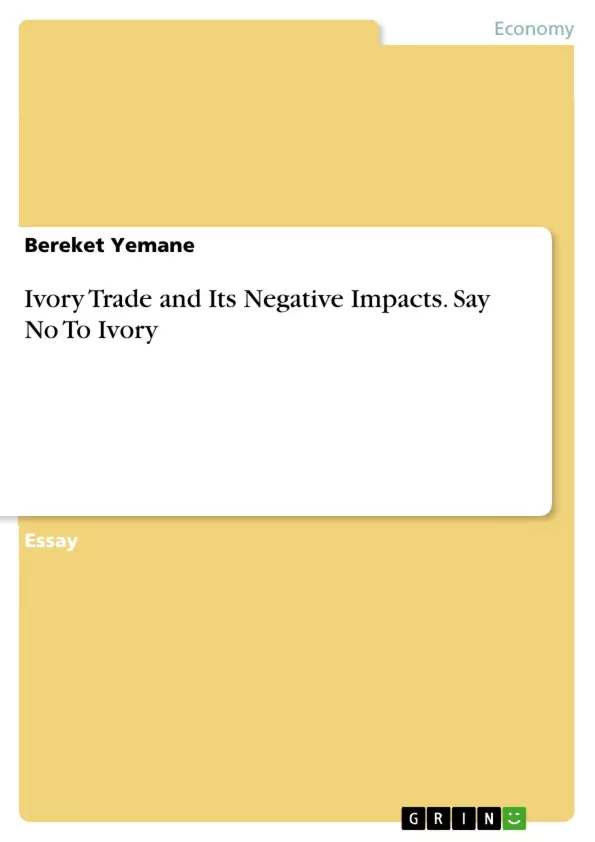Have you ever considered that the percentage of elephants killed is faster than the percentage of elephants being born? According to the wildlife conservation society, 96 African elephants are killed every day for ivory; at this rate, no elephants will be left in 20 years (Jones, 2015). This directly means 34,560 elephants get killed every year. Imagine to what extent that they are being killed every year! Ivory trade was started during the seventh and eighth centuries, when Muslim Arabs secured a trade monopoly in Maghreb, in the north African countries of Morocco, Algeria and Tunisia, between the Atlas mountain and the Mediterranean with peoples of the Sahara; as it was used for luxury goods by Carving, it was considered as a commodity from the early times (Seaver, 2009). This situation created the illegal ivory trade in the world. At the same time, poachers started to hunt elephants, so as to sell their ivory on the black market for an exorbitant price. Consequently, the elephant species started to become extinct. Hence, people should not buy ivory products as it Causes the extinction of elephant species, the devastating decline of plant species, and negative impact on herbivorous animals.
The first reason why people should not buy Ivory products is because it causes to the rapid trending down in the population of elephant species, which finally leads to extinction of the species. People should consider that, buying Ivory products would literary mean encouraging poachers to continue their brutal act on elephant species. According to the Wildlife Conservation Society, 96 elephants are killed by poachers every day to meet the demands of ivory trade (Jones, 2015). For instance, In1976, The African Elephant Specialist Group estimates that there were 1.3 million elephants ranging over 7.3 square kilometer; then after 11 years the elephant population decreased to 760,000; the preceding 2 years also dropped to 608,000 (Stiles, 2004, p. 312). Imagine what is going to happen if the number is continuously decreasing like this! We are killing them just for their ivory.
Inhaltsverzeichnis (Table of Contents)
- Ivory Trade and Its Negative Impacts
- The Rapid Trending Down in the Population of Elephant Species
- The Devastating Decline of Plant Species
- The Negative Impact on Herbivorous Animals
Zielsetzung und Themenschwerpunkte (Objectives and Key Themes)
This paper argues against the purchase of ivory products, highlighting the detrimental effects of ivory trade on elephants, plant life, and herbivorous animals. It seeks to raise awareness about the consequences of this practice and encourage a shift in consumer behavior.
- The extinction of elephant species due to poaching
- The impact of elephant decline on plant biodiversity
- The negative consequences for herbivorous animals
- The ethical implications of ivory trade
- The importance of ecosystem balance and its connection to elephant populations
Zusammenfassung der Kapitel (Chapter Summaries)
The paper explores three primary reasons why people should not buy ivory products. The first reason focuses on the rapid decline of elephant populations due to poaching, driven by the demand for ivory. The text highlights the devastating impact of this decline on the ecosystem, specifically affecting the germination of new trees and biodiversity.
The second reason delves into the impact of elephant decline on plant species. The paper explains how elephants play a crucial role in seed dispersal, and their disappearance leads to the poor dispersal or even extinction of certain plant species. This, in turn, affects the overall health and balance of the ecosystem.
The final reason emphasizes the negative impact of ivory trade on herbivorous animals. The text illustrates how elephants modify the forest environment, creating favorable conditions for grazers. The disappearance of elephants disrupts this balance and negatively affects the survival of herbivores, highlighting the indirect consequences of ivory trade on the entire ecosystem.
Schlüsselwörter (Keywords)
The key topics and concepts explored in this paper include ivory trade, elephant extinction, biodiversity loss, seed dispersal, herbivore dependence, ecosystem balance, and ethical implications of consumer choices.
Frequently Asked Questions
Why is the ivory trade leading to elephant extinction?
Poaching for ivory kills approximately 96 elephants every day, which is faster than the birth rate of the species, potentially leading to extinction within 20 years.
How does the decline of elephants affect plant life?
Elephants are crucial for seed dispersal. Their disappearance leads to the failure of certain tree species to germinate, resulting in a devastating decline in plant biodiversity.
What is the impact of ivory trade on herbivorous animals?
Elephants modify forests and create favorable conditions for grazers. Without them, the habitat changes in ways that negatively impact the survival of other herbivores.
When did the ivory trade begin?
The trade dates back to the 7th and 8th centuries, starting as a luxury commodity monopoly in North Africa.
How can consumers help stop the extinction of elephants?
The most effective way is to stop buying ivory products, which removes the financial incentive for poachers to hunt elephants.
- Quote paper
- Bereket Yemane (Author), 2016, Ivory Trade and Its Negative Impacts. Say No To Ivory, Munich, GRIN Verlag, https://www.grin.com/document/380900



